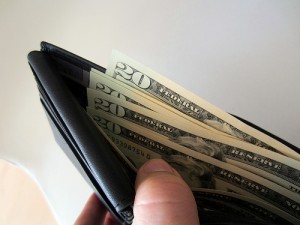 I started my new teaching job at the beginning of March, but due to the pay schedule I didn’t receive my first paycheck until the first week of April. It’s been two years since the last time I had a regular paycheck of my own, and it was quite a thrill when the money showed up in our bank account. I felt that old “pay day” elation, and let me tell ya, it’s a powerful drug.
I started my new teaching job at the beginning of March, but due to the pay schedule I didn’t receive my first paycheck until the first week of April. It’s been two years since the last time I had a regular paycheck of my own, and it was quite a thrill when the money showed up in our bank account. I felt that old “pay day” elation, and let me tell ya, it’s a powerful drug.
My plan for my income from the start has been to devote it entirely to beefing up our savings and paying down our student loan debt. Because I’m not sure how long I’ll be earning this money, it was never intended to be lumped into our regular income. But my bi-weekly paychecks are almost equal to the amount we’ve allotted to “day-to-day purchases” — groceries, household goods, and spending money. Suddenly, it felt like our “day-to-day money” had doubled.
Let’s just say, it’s been a pretty fun couple of weeks. I enrolled Judah in a summer gymnastics program, switched from my current gym membership to a more expensive YMCA membership (with a hefty enrollment fee), and did some damage in Target a few times.
Then I realized: this is how it happens. Your income increases, you tell yourself, “Just this once — we can afford it now.” And before you know it, your monthly budget has increased with no extra savings to show for it. It’s the very definition of lifestyle inflation.
Thankfully, I realized it before it’s too late. It still feels like “extra money,” so I have time to adjust the budget and reallocate the money before it becomes a serious habit. Only now it will feel a little like deprivation for the first few paychecks, because I already experienced the powerful drug of spending it.
I’m not saying that there’s no room to loosen up when your income increases. If you get a raise or find some other source of extra income, it’s okay to loosen up some areas of your budget. Just make sure you have a plan to put some of that money to good use, too. Save some money, repay some debt, increase your retirement contributions, and then spend a little. The point is that if you’re not mindful of how you spend income increases, you’ll get stuck in a cycle where you spend every penny you earn forever and ever. It’s a good way to feel broke no matter how much you make.
Don’t let this happen to you. Make a plan for your income increases before the money hits your bank account, and stick with it. Your future self will thank you for it.
I hear ya! I am bad with this when it comes to my blog income. Some of it gets saved but a lot of it just gets absorbed and spent.
I learned my lesson though and Shane just got a COLA and we set up an automatic transfer of the amount of the raise to move that money into a savings sub-account. I know I gotta protect myself from myself!
I hear ya! My hubby got a $7K raise that we were not expecting so we immediately figured out how much more we would get in his check. We then spread the extra money across our three kids college savings account. We are really trying to save more because we have 15yo twins in 9th grade and a 12yo in 6th. My hubby was alittle sad the money was gone but I think he understood. I told him that if he gets a bonus he gets a chunk to spend on himself.
I worked at my job for over a year before we started counting on that money for our regular budget. Unfortunately life happens and we had numerous expenses that came up during that year. If I had not been working we would have depleted our savings. Instead we were able to pay for things as they came up and in the end still save some of my income in that year. Sadly with increased cost of living we have had to start including most of my paycheck in our regular budget. ugh!
Couldn’t agree with you more Karen: people need to make a plan for their money before it hits their bank account. A good budget should accomplish this – people need to tell their money where it should go before they even have it!
Thanks for a great reminder post that we all need to be careful about lifestyle inflation.
All my working life I have had a simple rule of thumb. Of every pay rise 50% goes into (automatic) savings, the rest is for lifestyle inflation. That way I felt I always created a financial win-win situation for myself.
Can’t agree more to the underlying problem that has been denoted above. With the increase of costly standard of living, most of the time it becomes highly difficult to maintain a certain savings per month. Budgeting is most important out of all, I agree. But along with it, when you collide with practicality, it gets troublesome to have an ample amount of savings after dealing with all the necessary expenses.